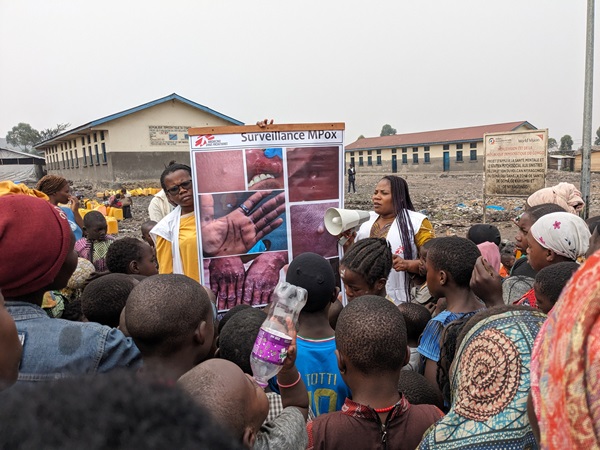 Democratic Republic of Congp;
Credit: Augustin Mudiayi/MSF
Democratic Republic of Congp;
Credit: Augustin Mudiayi/MSF
On Tuesday 13 August 2024, Médecins Sans Frontières Luxembourg announced that the Africa Centres for Disease Control and Prevention (Africa CDC) declared Mpox (formerly known as monkeypox) a continental security “public health emergency,” a new initiative to strengthen the public health response on the continent.
The outbreak has affected several African countries, particularly the Democratic Republic of Congo (DRC). According to CDC data, as of 4 August 2024, there have been 38,465 cases of Mpox and 1,456 deaths in Africa since January 2022.
On Wednesday 14 August 2024, the European Commission’s Health Emergency Preparedness and Response Authority (HERA), announced the purchase and donation of 175,420 doses of the MVA-BN® vaccine, the only smallpox vaccine approved by the Food and Drug Administration (FDA) and the European Medicines Agency (EMA), in immediate response to the Mpox outbreak in Africa. In addition, the pharmaceutical company Bavarian Nordic will donate 40,000 doses to HERA. The Africa CDC will distribute the vaccines according to regional needs. The African Union has also stated that it will release $10 million from the COVID-19 Fund to fight the epidemic.
In response to this emergency, Médecins Sans Frontières (MSF) has set up several interventions to support the response to this epidemic. Currently, interventions are underway in the DRC in the provinces of North Kivu, South Kivu, Equateur and Sud-Ubangi. Depending on the evolution of the epidemic, other interventions may be implemented.
Dr Amrish Baidjoe, Director of the MSF Operational Research Unit in Luxembourg (LuxOR); epidemiologist and microbiologist, made the following statement:
“We are currently seeing an escalation of outbreaks of Mpox in several countries on the African continent. Mpox has been endemic in several countries on the African continent but the current number of outbreaks and confirmed cases is unprecedented. There are several variants circulating but at this moment it is not clear how exactly the impact of these variants differs. We are seeing a large number of cases in the Republic of Congo but also observe outbreaks in other countries where we didn’t observe these before and where MSF has operations.
There is a vaccine that protects relatively well against disease but it is not widely available. This is particularly important for risk groups such as people who are immunocompromised (such as HIV/AIDS patients), children, pregnant women and the elderly. In addition to making vaccines more widely available, it is also important that diagnostic tools are made more widely available so that we can better diagnose but also better monitor the continuation of these outbreaks. Following the many lessons we have learned from COVID, it is important that the international community follows through on its promises to make vaccines and diagnostic tools more widely available."
He explained that within the current medical projects, MSF is collaborating with local partners to enhance patient management and treatment, while also focusing on preventive methods and health education that avoids stigmatisation. He added that they are also exploring ways to improve data collection and surveillance to better understand outbreak trends and gain deeper insights into the disease, potentially through future research.
Mpox is a disease caused by the monkeypox virus. It is transmitted by close contact between people or with infected animals. It has been endemic in Central Africa (strain I) and West Africa (strain II) since the 1970s and it has spread rapidly around the world in 2022-2023. Tens of thousands of cases linked to the West African variant have been reported in more than 110 countries.
Mpox causes rashes, lesions, and pain, all of which require supportive treatment to manage the symptoms as effectively as possible and avoid further complications. Most patients treated recover within a month, but if left untreated, the disease can be fatal. In DRC, where the mortality rate for the strain is significantly higher than in West Africa, more than 479 people have died since the beginning of this year. By comparison, the World Health Organization (WHO) estimates that mpox claimed the lives of 89 people worldwide in 2022.








